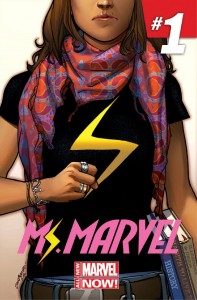Kamala Khan is a first-generation American-Muslim. Her parents are immigrants from Pakistan. She’s a sixteen-year old girl, who braves high school life in New Jersey. Khan is also Ms. Marvel.
The original Ms. Marvel, Carol Danvers, debuted in the late sixties, a buxom blonde who served as a member of the United States Air Force. One would be hard-pressed to find anything more American, but with the announcement of Khan as Ms. Marvel, it begs the question of what is truly American.
Being a sixteen-year old superhero comes with its fair share of problems, but even more so when one is a member of a culture often misunderstood by the American populace. Editor of Ms. Marvel, Sana Amanat, told The Associate Press, that she wants the series to exemplify “the Muslim-American diaspora from an authentic perspective.” The idea for creating a character with this particular type of background actually came from Amanat’s own personal experiences as a Muslim-American.
Because superheroes and heroines serve as icons for truth and justice, and like the characters of a favorite book or movie, it’s easy for readers to become attached. Amanat does expect some backlash from the decision to have Ms. Marvel portrayed by a female Muslim-American. However, Amanat believes this negative reaction isn’t just confined to those with an Anti-Muslim perspective. Those within the Muslim community might have issue with how Khan should be depicted.
Many comic books touch on similar themes, such as encroaching adulthood, social issues, and the liquid definition of morality. The new Ms. Marvel appears to be no different than its predecessors in that regard. The core issues remain the same, but the perspective changes. Now that the heroine is a member of the minority group, these themes will shift, incorporating Khan’s culture and how it fits into her life. Raised by a pair of traditional, Pakistani immigrant parents, the new Ms. Marvel offers readers a way to address or observe the outlook of the world from a Muslim-American, but in an approachable way.
Ms. Marvel isn’t the first minority to protect the world from evildoers, and she certainly won’t be the last. A couple years ago, Marvel introduced their new Spider-Man, Miles Morales, a young man of mixed descent. Both DC and Marvel have also introduced gay superheroes in recent years.
Regardless of the success of the new Ms. Marvel, the emerging trend of non-traditional superheroes will continue to grow. With minority groups achieving milestones – gay marriage being legalized, the first African-American president, etc. – having a more diverse cast of crime-fighting characters should become the norm. While it’s nice to see people of all backgrounds making their way into all facets of society, a bigger accomplishment would be when it’s no longer a surprise, when the majority is no longer surprised when a member of a fringe culture gains the spotlight.
Edited by Amanda Diehl, TIM Associate Editor.







